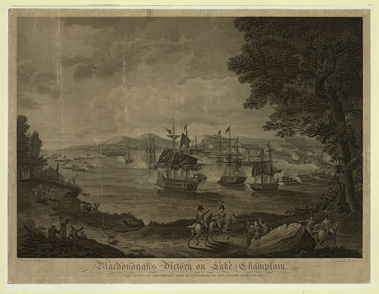By the time the campaigning season in 1814 opened, the tide had turned against Napoleon in Europe, profoundly impacting the war in America. Napoleon’s invasion of Russia in June 1812 ended in disaster, and in October 1813 Britain’s allies on the Continent won a major victory at Leipzig. With the war on the Continent turning against Napoleon, the British in late 1813 began cautiously redeploying forces to America, and thereafter their prospects in both wars steadily improved.
"We should have to fight hereafter not for "free trade and sailors rights," not for the conquest of the Canadas, but for our national existence." An American statesman

Library of Congress, Prints and Photographs Division
While Britain’s allies on the Continent (who were part of the Sixth Coalition) pursued Napoleon to Paris from the east, the Duke of Wellington fought his way into France from the Spanish Peninsula in the south. By the spring of 1814, France had had enough. Napoleon abdicated unconditionally and was exiled to the Mediterranean island of Elba. With the restoration of peace in Europe, the British could step up the redeployment of their military and naval assets to the American war and take the offensive. This fundamentally changed the character of the War of 1812. “We should have to fight hereafter,” said one Republican, “not for ‘free trade and sailors rights,’ not for the conquest of the Canadas, but for our national existence.”
In the campaign of 1814, the United States remained on the offensive on the Niagara frontier, and the result was a series of bloody but inconclusive battles—at Chippawa, Lundy’s Lane, and Fort Erie. Further east, the young republic was thrown on the defensive. The British enjoyed some success, seizing a hundred miles of the coast of Maine and the Nation’s Capital in Washington and burning the public buildings there, but elsewhere they were rebuffed. An inland naval victory engineered by Master Commandant Thomas Macdonough on Lake Champlain forced the British to give up a major invasion of New York. At the same time, the construction of extensive earthworks combined with the successful defense of Fort McHenry compelled them to abandon a planned assault on Baltimore.
In early 1815, the British invaded the Gulf Coast, where the United States appeared to be particularly vulnerable. New Orleans, which was the biggest port city in the West, was largely undefended, and the population, which was heavily French and Spanish, felt no loyalty to the young republic. “The War of the U.S. is very unpopular with us,” John Windship, a transplanted New Englander, reported in early 1814. French and Spanish residents who were called up for militia duty in New Orleans “absolutely refused to be marched” and “declared themselves liege subjects of Spain or France.” Spain, which was allied to Great Britain, had never been happy with the Louisiana Purchase, and there was talk that the British might seize the entire territory and return to Spain. Although the British were only interested in seizing territory that might be used in the peace negotiations, Andrew Jackson prevented even this with his victory at New Orleans. “Old Hickory’s” triumph was not simply the most lopsided of the war but one of the most lopsided defeats ever suffered by a British army in any war. The British lost over 2,000 killed, wounded, missing, or captured, while Jackson’s losses were only 70.
Part of a series of articles titled The Global Context of the War of 1812 .
Last updated: March 6, 2015
